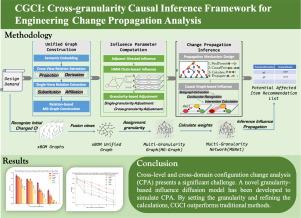CGCI:工程变化传播分析的跨粒度因果推理框架
IF 8
1区 工程技术
Q1 COMPUTER SCIENCE, ARTIFICIAL INTELLIGENCE
引用次数: 0
摘要
在大规模复杂产品开发的动态环境中,配置数据的不断生成和积累受到不断变化的需求和版本变更等因素的影响,呈现出跨领域和跨级别的特点。这种复杂性给受控变更管理带来了巨大挑战。有效变更管理的核心是变更传播分析(CPA),尤其是准确预测对受影响项目的潜在影响。然而,传统的 CPA 方法不足以应对跨领域、跨级别推断的挑战。因此,我们提出了为 CPA 量身定制的跨粒度因果推理框架(CGCI)。该框架利用影响的扩散和衰减,能够有效识别潜在的配置项。为了评估 CGCI 的可行性,我们利用原始工业配置数据构建了一个数据集,并对飞机配置变更控制进行了全面的案例研究。对比分析的结果表明,CGCI 能有效解决多粒度和多跳推理问题,在多粒度情况下考虑更全面,推理开销更少。本文章由计算机程序翻译,如有差异,请以英文原文为准。

CGCI: Cross-granularity Causal Inference framework for engineering Change Propagation Analysis
In the dynamic landscape of large-scale and intricate product development, the constant generation and accumulation of configuration data, influenced by factors such as evolving demands and version alterations, exhibit inter-domain and inter-level characteristics. This complexity presents formidable challenges to the management of controlled changes. Central to effective change management is Change Propagation Analysis (CPA), particularly in accurately predicting the potential impacts on affected items. However, conventional CPA methods are insufficient for addressing the challenge of cross-domain, cross-level inference. Therefore, we propose a Cross-granularity Causal Inference Framework (CGCI) tailored for CPA. This framework leverages the diffusion and attenuation of influence, enabling efficient identification of potential configuration items. To assess the feasibility of CGCI, a dataset is constructed using raw industrial configuration data and conducted a comprehensive case study on aircraft configuration change control. The results of our comparative analysis show that CGCI is effective in addressing multi-granularity and multi-hop inference problems, with more comprehensive consideration and less inference overhead in the multi-granularity case.
求助全文
通过发布文献求助,成功后即可免费获取论文全文。
去求助
来源期刊

Advanced Engineering Informatics
工程技术-工程:综合
CiteScore
12.40
自引率
18.20%
发文量
292
审稿时长
45 days
期刊介绍:
Advanced Engineering Informatics is an international Journal that solicits research papers with an emphasis on 'knowledge' and 'engineering applications'. The Journal seeks original papers that report progress in applying methods of engineering informatics. These papers should have engineering relevance and help provide a scientific base for more reliable, spontaneous, and creative engineering decision-making. Additionally, papers should demonstrate the science of supporting knowledge-intensive engineering tasks and validate the generality, power, and scalability of new methods through rigorous evaluation, preferably both qualitatively and quantitatively. Abstracting and indexing for Advanced Engineering Informatics include Science Citation Index Expanded, Scopus and INSPEC.
 求助内容:
求助内容: 应助结果提醒方式:
应助结果提醒方式:


